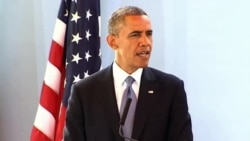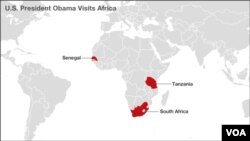DAKAR —
President Barack Obama, visiting Senegal, praised the country's democratic progress, saying it sets an example for Africa. Senegal was the first stop for Obama and his family on their weeklong trip to Africa that includes South Africa and Tanzania.
Thousands turned out to welcome America's first African-American president, on his first return to sub-Saharan Africa since 2009.
At the presidential palace in Dakar, Obama and First Lady Michelle were welcomed by Senegalese President Macky Sall and his wife Mareme.
Bilateral talks covered a range of issues, from U.S. support for Senegal's democracy and infrastructure to joint security.
President Obama praised Sall for his openness and anti-corruption efforts. He said Senegal is an example for Africa.
“It is moving in the right direction, with reforms to deepen democratic institutions and as more Africans across this continent stand up and demand governments that are accountable and serve the people, I believe Senegal can be a great example," said President Obama.
Speaking one day after a U.S. Supreme Court decision validating gay marriage, Obama said African nations that make homosexuality a crime should make sure gays and lesbians are not victims of official discrimination.
"I believe everybody has to be treated equally," said Obama.
President Sall responded by calling his country tolerant and not homophobic, though he said Senegal is not ready to decriminalize homosexuality.
Speaking about economic development, Obama said U.S. policy emphasizes partnership and trade rather than merely assistance.
President Sall said Africa needs good governance to make use of its resources.
“We have tremendous natural resources, we have a lot of human resources, we need infrastructure to accompany the development of all these resources, but all this in the context of good governance, otherwise these resources will be in vain," said President Sall.
First Lady Michelle Obama and her mother joined the president at a museum on Goree Island dedicated to the West African slave trade. Centuries ago, Africans were held captive here before being shipped off, in chains, to be slaves.
Obama said the tour here was a powerful moment that reminded him about the importance of human rights.
"I think more than anything what it reminds us of is we have to remain vigilant," he said.
Earlier, Obama's spoke of former South African President Nelson Mandela, now gravely ill in a Pretoria hospital.
The president called Mandela a hero for the world, whose legacy will last through the ages.
The Obamas leave for South Africa on Friday.
Thousands turned out to welcome America's first African-American president, on his first return to sub-Saharan Africa since 2009.
At the presidential palace in Dakar, Obama and First Lady Michelle were welcomed by Senegalese President Macky Sall and his wife Mareme.
Bilateral talks covered a range of issues, from U.S. support for Senegal's democracy and infrastructure to joint security.
President Obama praised Sall for his openness and anti-corruption efforts. He said Senegal is an example for Africa.
“It is moving in the right direction, with reforms to deepen democratic institutions and as more Africans across this continent stand up and demand governments that are accountable and serve the people, I believe Senegal can be a great example," said President Obama.
Speaking one day after a U.S. Supreme Court decision validating gay marriage, Obama said African nations that make homosexuality a crime should make sure gays and lesbians are not victims of official discrimination.
"I believe everybody has to be treated equally," said Obama.
President Sall responded by calling his country tolerant and not homophobic, though he said Senegal is not ready to decriminalize homosexuality.
Speaking about economic development, Obama said U.S. policy emphasizes partnership and trade rather than merely assistance.
President Sall said Africa needs good governance to make use of its resources.
“We have tremendous natural resources, we have a lot of human resources, we need infrastructure to accompany the development of all these resources, but all this in the context of good governance, otherwise these resources will be in vain," said President Sall.
First Lady Michelle Obama and her mother joined the president at a museum on Goree Island dedicated to the West African slave trade. Centuries ago, Africans were held captive here before being shipped off, in chains, to be slaves.
Obama said the tour here was a powerful moment that reminded him about the importance of human rights.
"I think more than anything what it reminds us of is we have to remain vigilant," he said.
Earlier, Obama's spoke of former South African President Nelson Mandela, now gravely ill in a Pretoria hospital.
The president called Mandela a hero for the world, whose legacy will last through the ages.
The Obamas leave for South Africa on Friday.







